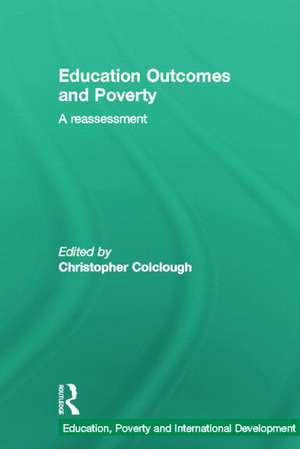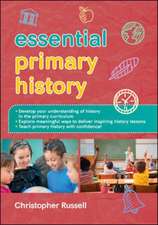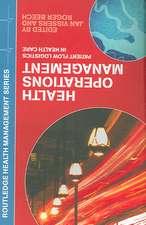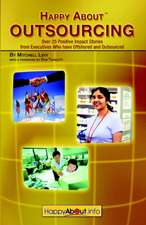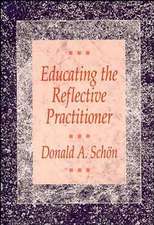Education Outcomes and Poverty: A Reassessment: Education, Poverty and International Development
Editat de Christopher Colcloughen Limba Engleză Hardback – 11 iun 2012
This book arises out of a five year, DFID-funded programme of research examining the impact of education on the lives and livelihoods of people in developing countries, particularly those living in poorer areas and from poorer households. Based on highly innovative research that addressed common research questions across four countries in Africa and South Asia, the book presents new theoretical and empirical knowledge that will help to improve education and poverty reduction strategies in developing countries, through an enhanced recognition of education's actual and potential role.
In addition to introducing the reader to a wide range of conceptual and policy-related problems concerning the impact of education on individuals and society, the book:
provides the field of educational research with a contemporary economic and socio-cultural reassessment of educational outcomes in relation to poverty.
discusses the challenges and priorities facing policy makers, practitioners and the international development community in improving the outcomes of education, particularly for the most disadvantaged in Africa, South Asia and other low income countries;
identifies the key theoretical and methodological challenges involved in researching the outcomes of education for the poor.
This book will appeal to undergraduate and postgraduate students and researchers in the fields of international and comparative education, education policy, development studies, African and Asian studies and related disciplines, and to those working on education policy at national or international levels in governments and international institutions. Education has an extraordinarily important role to play in efforts to eliminate poverty world-wide. This book reveals the nature and complexity of these relationships and provides indispensible pointers to the kinds and extent of policy changes that are required.
| Toate formatele și edițiile | Preț | Express |
|---|---|---|
| Paperback (1) | 412.37 lei 6-8 săpt. | |
| Taylor & Francis – 17 iul 2014 | 412.37 lei 6-8 săpt. | |
| Hardback (1) | 1055.66 lei 6-8 săpt. | |
| Taylor & Francis – 11 iun 2012 | 1055.66 lei 6-8 săpt. |
Preț: 1055.66 lei
Preț vechi: 1287.38 lei
-18% Nou
Puncte Express: 1583
Preț estimativ în valută:
202.02€ • 219.37$ • 169.70£
202.02€ • 219.37$ • 169.70£
Carte tipărită la comandă
Livrare economică 22 aprilie-06 mai
Preluare comenzi: 021 569.72.76
Specificații
ISBN-13: 9780415582025
ISBN-10: 0415582024
Pagini: 240
Ilustrații: 12 b/w images and 27 tables
Dimensiuni: 156 x 234 x 14 mm
Greutate: 0.48 kg
Ediția:1
Editura: Taylor & Francis
Colecția Routledge
Seria Education, Poverty and International Development
Locul publicării:Oxford, United Kingdom
ISBN-10: 0415582024
Pagini: 240
Ilustrații: 12 b/w images and 27 tables
Dimensiuni: 156 x 234 x 14 mm
Greutate: 0.48 kg
Ediția:1
Editura: Taylor & Francis
Colecția Routledge
Seria Education, Poverty and International Development
Locul publicării:Oxford, United Kingdom
Public țintă
Postgraduate and UndergraduateCuprins
1. Introduction 2. Girls’ Schooling and Women’s Autonomy in South Asia: Revisiting Old Debates with New Data from India and Pakistan 3. Schooling, Rights and Urban Poverty: Young People's Narratives of Citizenship in Two Sub-Saharan Cities. 4. Increased Expectations, Unrealised Gains: Education Outcomes for Young People with Disabilities in India and Pakistan 5. Skill Acquisition and its Impact upon Lives and Livelihoods in Ghana, India, and Pakistan 6. Economic Returns to Schooling and Cognitive Skills – An Analysis of India and Pakistan 7. Changing Forms of Provision and Impact on Schooling Outcomes in Ghana and Pakistan 8. The Practice of Partnership: Aid and Education Policy in India and Kenya 9. Outcomes Reassessed. Annex 1: Qualitative Methods in the RECOUP Projects. Annex 2: The RECOUP Household Surveys
Descriere
Based on highly innovative research that addressed common research questions across four countries in Africa and South Asia, the book presents new theoretical and empirical knowledge that will help to improve education and poverty reduction strategies in developing countries, through an enhanced recognition of education's actual and potential role.
